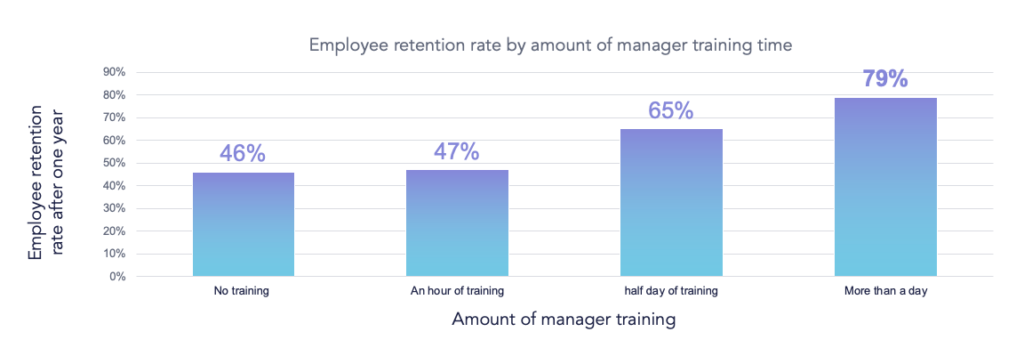New survey data on manager training
Are good athletes grown or born? Certainly genetics are a major factor in high-level athletics, but even Usain Bolt wouldn’t win a race without having coaching and practice first.
Yet, many companies expect their high performing individual contributors to get promoted into new roles as people managers without any training. Even if you have an Olympic-level employee, dropping them into a people-managing job without training is setting them up for failure. Even worse, the stakes are not just them, but every employee they manage. When it goes poorly, the company loses the promoted high-performer, plus the employees that report to this person are more likely to perform poorly and leave the company.
To investigate manager training, Whistle commissioned a survey of 250 managers in the manufacturing industry. We found a wide range of training strategies. About half of companies are doing a full day of training or more. However, 34% said they received three hours or less of management training when they were first promoted. Even more concerning, 11% said they received no management training of any kind.
People don’t leave jobs, they leave untrained managers
Why is this important? The managers who received no management training reported 260% higher turnover on their teams than managers who received more than a day of training. Maybe it is time to update the old adage “people don’t leave jobs, they leave managers,” to “people don’t leave jobs, they leave untrained managers.”
Manager training is not just a box-checking exercise, with on and off. There are shades of gray, and they all point to more training being better for the managers and employees. Managers who received more than a day of management training had, on average, 79% retention on their teams over the past 12 months. For managers who got a half-day, retention falls to 65%. For those with less than one hour of training, retention was 47%. For those who got no management training, retention was 46%.

Building the business case for better manager training
The ROI case for more management training is overwhelming. Let’s say a company is currently doing none or very little training for new managers. If they were to start a half or full day training program, they could expect an 18 percentage point increase in retention. If the average salary is $50,000 and the cost of turnover is one third of that, then a company of 1,000 people could save $3 Million per year in turnover costs. A company of 5,000 could save $15 Million. And those are just the direct costs. Harder to quantify are the impacts on culture and institutional knowledge. Any HR leader looking to justify a manager training program has overwhelming budget justification.
An effective training program for people managers means deliberate, ongoing training. How much is too much? Any good people manager will tell you they are always hungry to improve. Our survey backs up that sentiment. When asked if more training would help their performance as a manager, 61% said they would expect a large improvement; 32% a small improvement; and only 8% said they would expect no change.
Learning to be a people manager is unlike any other job skill. People are more complex than learning how to operate a piece of machinery or code a computer. Managing people means having hard conversations, negotiating salaries, settling disputes, and growing careers. Yet, many companies think that individual contributors can just step into a new role without any help. That mistake costs companies millions in turnover and lost productivity every year. Whistle’s research shows that training works and managers want more of it.
About Whistle
Whistle is the first learning platform to integrate the key elements that drive business outcomes – ability (microlearning), motivation (micropayments and recognition), cues (AI informed nudges and recommendations) while removing friction (simplified design and mobile centric approach). Together these multiply the impacts of microlearning to maximize the impact on business outcomes.









